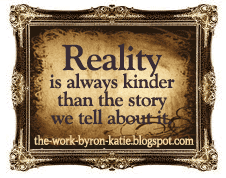Loving What Is
Loving What Is is a book by Byron Katie that I'd picked up several years ago. Referencing the book during an episode of great emotional turmoil, I felt enraged at the nonsense and tossed the book aside.
My First Introduction to Byron Katie
A few years later, without alcohol and without the other harmful behaviors I used to engage in due to 12 step recovery, I was still miserable and in great emotional pain. Primarily, I was still miserable due to my HSP [Highly Sensitive Person] personality that *no one* seemed to 'understand.' I didn't understand. This caused me a lot of problems because I so internalized everything and was miserable doing it.
In the summer of 2005, sick with an unexplained fever and pain, bedridden and riddled with a mysterious infection the doctors could not identify, I re-picked up Katie's Loving What Is that had somehow managed to make it to my nightstand despite my having never read it for the year I'd had it. I began reading it out of sheer desperation. But not before hurling it across the room.
No 12 step meetings or groups had been able to help with the PTSD I'd suffered with due to a childhood trauma. No 12 step group was assisting with my current nightmares, my recently ended relationship, my new relationship, or the fact I was pissed at God and on strike. It was amazing I'd stayed sober from alcohol and yet still, I was a walking victim made immobile due to it all catching up with me.
The Work or Inquiry
Four Questions and a Turnaround
The Work consists of questioning your stressful thoughts. For every stressful thought, you hold it up to the Four Questions on paper. This is important to do it on paper. Metaphysically or symbolically I am 'dumping' the truth as I currently see it onto paper.
For me - and maybe for you, too - two stressful thoughts in my head can go around and around and divide into so many more. I jokingly tell my friends, "They're having babies."
Putting it on paper, not only puts it all into perspective as I write my current stressful thoughts down, but I am also allowing my mind an opportunity to get ready to change. Then, for each stressful thought, hold these questions up to it.
The Four Questions
1. Is it true?
2. Can you absolutely know that it's true?
3. How do you react, what happens, when you believe that thought?
4. Who would you be without the thought?
Now the Turnaround: You turn around the original statement you're holding up to Inquiry and you find examples of the turnaround being as true or truer than your original thought. This gives the Seeker an opportunity to expand the mind to include thoughts we - prior to this - never considered.
"I Should Not Smoke."
(Yet here you are, smoking.Or you plan on smoking again.) 1.] "Is that true?"
1.] "Is that true?"Of course it's true. The Surgeon General says I should not smoke. My grandmother died from lung cancer due to smoking. It's a filthy habit and it stinks. I hate myself that I smoke. I hate having to spend money on the cigarettes. And besides, all my friends are stopping and everyone is on my back to stop. Even my boss at work is always harassing me to stop.
2.] "Can you absolutely know that it's true that you should not smoke?"
Can I absolutely know? Well, yes. I'm taking money from the family to support my habit. I am starting to cough. Businesses are disallowing patrons to smoke. I've turned into a 5th class citizen. So yes, I definitely know I should not smoke. (As you hold a cigarette.)
3.] "How do you react, what happens, when you believe that thought, 'I should not be smoking and you are'?"
I get angry with myself and I begin to feel so anxious. I feel like a loser. I get so stressed, I am sure I smoke more just thinking about it.
4.] "Who would you be, how would you feel, without the thought 'I should not be smoking'?"
I would definitely not feel stressed out, anxious and like a loser.
Can you find a turnaround?
"I should smoke."
Do you have examples of how or why this is true or truer?
Example #1: Well, I should smoke because I am.
Example #2: Smoking is enjoyable for me.
Example #3: I am a recovering alcoholic. This cigarette might be preventing me from having a screwdriver.
Reality versus Shoulds
Arguing with Reality by Shoulding on Yourself is Stressful
Smoking may be unpopular in our culture, but this Inquiry is not about popularity. Statistics may tel us what smoking does to our physical health, but again, this is not about statistics. It is not about 'may be' or 'shoulds.' It is about sanity over stress; clarity over confusion. And when I meet myself where I am instead of blaming, shaming or judging myself for where I am not, I do not have stress.
Keep in mind that "The Work" has absolutely nothing to do with stopping or starting a behavior you may dislike or desire. All we are dealing with here are the thoughts that give us stress. For example, in 10 minutes I may not want a cigarette and so I will not have one. In 10 minutes I may want a cigarette and I may have one - and hopefully it will be a beautiful time free of stressful thoughts. Tomorrow I will be having coffee in the morning. I will have the thought that I want to work out. So I plan a time to work out and I work out. I will not need to sit and stress all day that "I hate my body. I am out of shape." or "I am fat." I have noticed that without stressful thoughts or stories I am a lot freer to simply be and do. I can decide I need to work out and do it. I do not need to beat myself up to do it or not do it. It just is.
Meeting ourselves where we are, is a beautiful action. More than that, if we do this truly, we will begin to notice how more fluidly our Self can decide to move into another action it's decided for itself. But this happens only later after after we have met ourselves where we are. If we continue trying to meet our Self where we are not, how will we ever know our Self in order to move our Self into a more pleasurable direction?
[ie, "I do not accept it is okay to smoke. I smoke. I do not accept my Self. I will beat myself into submission until I quit smoking." So the subconscious mind feels stressed and picks up another cigarette, hating the Self until some undetermined point in time that may never arrive?]
If this is confusing, do not worry. I'll have more examples on this page and scattered throughout The Work of Byron Katie in Action.
"I am too short. I should be taller."
(Can you relate to dissatisfaction with body?)1.] "Is that true?"
Yes! I am 5'2" and that is entirely too short. It's hard to find pants cause I have long legs but on a short body.
2.] "Can you absolutely know that it's true that you are too short?"
Yes. It's a fact. I need to be taller.
3.] "How do you react, what happens, when you believe that thought, 'I should be taller and you're not'?"
I feel insecure. I feel that people treat me like a little girl and that makes me feel self-conscious and stupid. I notice that I walk with my head down a lot, too. Which, now that I think about it, makes even shorter, doesn't it?
4.] "Who would you be, how would you feel, without the thought 'I should be taller'?"
I am pretty sure I'd feel like the woman I am. I envision myself walking confidently with my head up and smiling at people I encounter. I see myself feeling smart and capable.
Can you find a turnaround?
"I am not too short. I should not be taller."
I hear you say, "I am not too short."
Do you have examples of how or why this is true or truer?
Example #1: I have some fabulous heels I can wear without feeling self-conscious about being taller than other people.
Example #2: If I were taller I could not be as good a dancer as I am. I have moves that tall people might have problems with.
Example #3: I am quite clumsy. If I were taller, I would have further to fall and might really hurt myself when I do.
Thoughts on our Turnarounds
Allow the mind another possibility
It does not matter how silly our "Turnaround" examples may be, maybe you have noticed. The point of the examples is to get the mind to offer the possibility [supportive evidence of why] of how the reality is a lot kinder than we give it credit for. Living in reality is the stress-free goal. Living in our imaginations, attached to our stories; remembering the past with an attachment to a painful story or imagining an unkind or painful future is where stress is.
You are entitled to your stressful or pained thoughts. This is exactly where I was when I first picked up The Work through Loving What Is; I was not ready yet. But when I was, I knew there was a solution for me. This feeling of hope followed me for the year or so when I did not pick up the book. As enlightened or clarified beings, we can still remember what pain is like and meet those still in pain with compassion as we hold their hand and bring them from the darkness of being - not because we want them to be free - but because they want to be free.
These 4 questions give our minds permission to stop. Putting the stress on paper quiets the mind as we look at it. We look at the stressful idea and we give it the airtime it seems to need. Then we breathe into the work and coming now from this safe place we can go back and look again at our stories. Our turnaround examples may not be the same ones someone else would choose and stop comparing yourself to others anyway. If our goal is to have peace where we are, it's up to us to meet ourselves where we are.
"My Boss Does Not Appreciate Me."
Doing The Work on Interpersonal Relationships1.] "Is that true?"
Yes! He is always bringing lunch in so I cannot leave for lunch. He never lets me have time off cause he doesn't know how to run the place. I am always scared when I want to take a lunch so I hardly ever do. And I do not know when the last time it was I had any time off.
2.] "Can you absolutely know that it's true that he does not appreciate you?"
Maybe not. Maybe that's not the right word. Maybe he appreciates me...? I don't know. I FEEL unappreciated. I feel like I am always giving 110% and yet I still cannot take the lunches I need for my sanity!
The work stops when you stop answering the questions. Be careful of that because the Mind will use all sorts of tactics to stop this process. What we're REALLY doing is training our Mind to undo or burn out its samskaras. (Or in a psychological rather than philosophical phrasing, "We're breaking patterns that have kept us in bondage." )
So once again, "Can you absolutely know that it's true that your boss does not appreciate you?"
No. I do not absolutely know.
3.] "How do you react, what happens, when you believe that thought, 'My boss does not appreciate me' ?"
I feel angry and stressed. I feel like an incompetent child. I do not feel capable of taking care of myself. I even find myself getting too scared to even ask to leave for lunch or take time off. I know he appreciates my abilities at work, but it is so stressing to think he does not value me - as a person with needs and wants.
4.] "Who would you be, how would you feel, without the thought 'My boss does not appreciate me?" Imagine yourself at work, it's 1:00pm and you've had a busy morning at work and would like to leave for lunch. But this time, you do not have the thought that your boss does not appreciate or value you as a person.
I see myself finishing up with a client. I glance over at him and I am not tense. I feel lighter and I feel good. I see the client leaving and I tell him I am taking a lunch. I am not feeling stressed, anxious, angry or worried.
Can you find a turnaround?
"My boss does appreciate me."
I hear you say, "My boss appreciates me." Do you have examples?
Example #1: Whenever I do ask for time off, I get it.
Example #2: When I have expressed a need to go out for lunch, he seems fine with it.
Example #3: I had a dentist appointment recently and I asked for the rest of the day off and got it.
Can you find another turnaround?
"I do not appreciate me."
So you don't appreciate or value your own self as a person. Give me some examples.
Example #1: I am too scared to ask to go to lunch to the extent I do not bother. I ignore my own needs.
Example #2: I keep waiting for him to read my mind. (He doesn't seem to be able to do that yet.)
Example #3: Maybe I feel that my value as a person is trumped by my own value as an employee.
What I am understanding, then, is that you do not appreciate or value your own needs but expect him to do it for you. Okay. This is a beautiful realization, isn't it? Let it begin with you. When you begin valuing your own needs watch how the world will 'all of a sudden' begin valuing you. It's amazing that it happens this way. It's been my experience that this is Loving What Is. Hearing more of your story I am sensing there might be even another turnaround.
Can you find another turnaround?
"I do not appreciate my boss."
Example #1: I expect him to read my mind (and all evidence suggests he can't).
Example #2: I do not trust that he won't fire me if I ask to leave for lunch.
Example #3: I look at my boss as a boss rather than a person I am capable of relating with.
So there you are. You want your boss to see you as a person but you view him as a boss and not a person; You want him to read your mind and because he isn't that is causing you stress, and to make matters more stressful for you, you are seeing images of a destitute future with no job and no money, because you won't ask to leave for lunches.
I think you can breathe into these new realizations and then re-examine that stressful thought that keeps you knotted up, "My boss does not appreciate me." And for every new stressful though you uncover that is perhaps protecting that one, you can again take it to Inquiry. For example, maybe examine the next thought, "I am scared of being out of a job."
This is how The Work works. We go to our thoughts and bring them to the light.
Final Thoughts on the Process of The Work
I've Done the Work. Now what?
So you've taken your stressful, painful, self-defeating thoughts, memories, projections and you have held them up to inquiry. You have done "The Work", made the turnarounds, found the examples, and here you are.
Now what?
My experience has been that I have been almost instantly transformed in some cases. In other cases, I have thoughts that maybe nothing happened until I realize a short time later that when in a previously stressful situation, I am not having the thoughts I used to have and am feeling and responding in a completely different way.
This has been my experience: I have never done The Work on a harmful, painful, stressful, or 'bad' thought, idea, belief, or memory with no change. It is very exciting.
Speaking of exciting, follow along at the rest of my blog, The Work of Byron Katie in Action for when or if this ever does happen. I plan on keeping an online journal of my experiences of when I do take thoughts to inquiry. These days, if I am under stress, it's almost an automatic response. I still have stressful thoughts that my mind tries to get me to believe... but these days I don't necessarily believe them. I start with the thought, "If it hurts, it is a lie." And from this premise, freedom.




No comments:
Post a Comment
I appreciate your taking the time to leave a comment. Thank you.